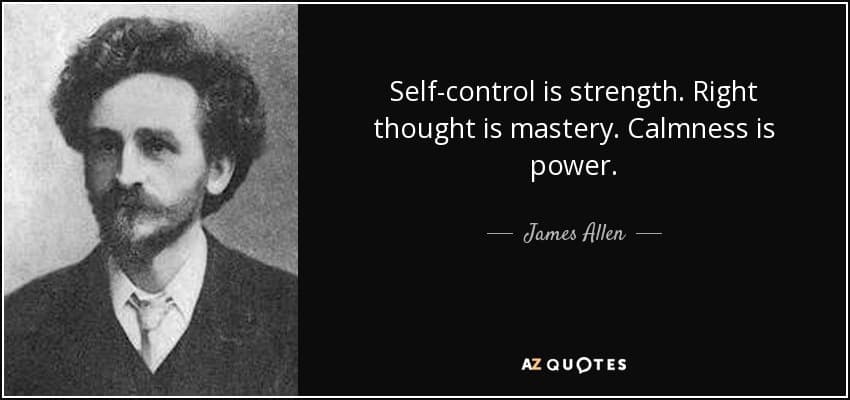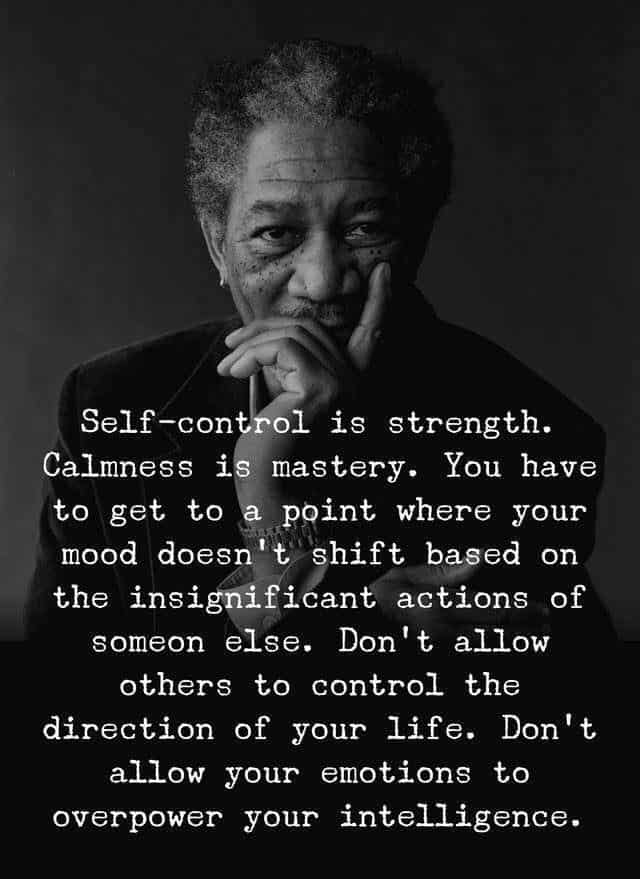Self-Control is Strength. Calmness Is Mastery. You – Tymoff
Self-Control is Strength. Calmness Is Mastery. You – Tymoff Discover the power of self-control, a vital skill for personal growth and success.

"Self-Control is Strength. Calmness Is Mastery. You" is a quote by Tymoff that emphasizes the importance of self-control and calmness in achieving mastery and strength. It suggests that one should not let insignificant actions of others affect their mood and should focus on developing self-control and calmness to achieve mastery and strength. The quote has been widely shared on social media and is often used as a motivational message.
Self-Control is Strength. Calmness Is Mastery. You – Tymoff
Self-control and calmness are two essential qualities that one can possess in life. The quote "Self-Control is Strength. Calmness Is Mastery" emphasizes the importance of these virtues in achieving mastery and strength. Self-control is a strength that enables us to resist our impulses and regulate our behavior. Calmness, on the other hand, helps us to stay focused under pressure and make sound decisions. By cultivating these qualities in our daily lives, we can achieve mastery over ourselves and become better versions of ourselves. However, it is essential to note that these virtues are challenging to develop and require consistent effort and practice.

Who is the original author of the quote?
The original author of the quote, "Self-Control is Strength. Calmness Is Mastery," is unclear. The quote has been attributed to both James Allen and Morgan Freeman, but no evidence supports either claim.
It is possible that the quote was coined by someone else and has been shared widely on social media. Regardless of who said it, the quote emphasizes the importance of self-control and calmness in achieving mastery and strength.
It suggests that by developing these virtues, we can become better versions of ourselves and easily navigate challenging situations.
Fact Check by Snopes
Does Morgan Freeman Really Believe That "Self-Control Is Strength"?
Snopes sought for the source of a phrase attributed to Morgan Freeman that has been used in Facebook memes and tweets at least since 2018.
Claim: Film actor Morgan Freeman said: "Self-control is strength. Calmness is mastery. You have to get to the point where your mood doesn't shift based on the insignificant actions of someone else. Don't allow others to control the direction of your life. Don't allow your emotions to overpower your intelligence."
Snopes rate this as "misattributed".
Users of Facebook and Twitter have circulated the following false quote with the name of actor Morgan Freeman under it since at least 2018:
"Self-control is strength. Calmness is mastery. You have to get to the point where your mood doesn't shift based on the insignificant actions of someone else. Don't allow others to control the direction of your life. Don't allow your emotions to overpower your intelligence."
The image of Freeman with the slogan "self-control is strength" has been shared hundreds of times on the Anxiety Freedom Today Facebook page. The majority of comments said, "So true!" In the past, we've discovered that many "So true!" comments can be a warning sign that the article may be at least partially inaccurate.
There is no proof that Freeman stated these words, even though it's possible that he agreed with some of the sentiment in the remark.
The first half of the quotation was originally taken from author James Allen's 1903 book, "As a Man Thinketh," not from Freeman, as the See the Butterfly blog properly noted in 2019. Project Gutenberg provided the original quotation with context.
According to Snopes, the saying "self-control is strength" was initially attributed to Allen, not Freeman.
Source:
April. “There Is so Much More Going on Here...” See the Butterfly, 16 Feb. 2019, https://www.seethebutterfly.com/2019/02/16/there-is-so-much-more-going-on-here/.The Project Gutenberg E-Text of As a Man Thinketh, by James Allen. https://www.gutenberg.org/files/4507/4507-h/4507-h.htm.

What is the context of the quote?
The context of the quote "Self-Control is Strength. Calmness Is Mastery" is the importance of self-control and calmness in achieving mastery and strength. The quote suggests that by developing these virtues, we can become better versions of ourselves and easily navigate challenging situations. Self-control is a strength that enables us to resist our impulses and regulate our behavior.
Calmness, on the other hand, helps us to stay focused under pressure and make sound decisions. The quote emphasizes the importance of maintaining composure and perspective under pressure and not letting the insignificant actions of others affect our mood. It suggests that by developing these virtues, we can achieve mastery over ourselves and become better equipped to handle life's challenges.
How can one develop self-control and calmness?
Developing self-control and calmness can be challenging, but it is possible with practice and dedication. According to Forbes, there are ten ways to master self-control: eating well, meditating, sleeping, exercising, and thinking positively. By mastering these skills, one can start tackling everyday life's burning issues and remain in control in stressful situations. Additionally, researching the issue that one is struggling with can also help develop self-control.
A Conscious Rethink suggests a simple strategy for short-term self-control, which is to pause and understand that just because one feels something, it does not mean that it is correct or that one has to act on it. One study on improving self-control suggests that people who regularly tried to build long-term self-control successfully achieved their goals.
Mental self-control's importance involves differentiating good from bad and staying away from negativity. It is also about staying away from negativities and not being part of any negativity. Good self-control and a sense of calmness will make one immune from the bad traits of others.
Developing self-control and calmness requires a combination of strategies, including eating well, meditating, sleeping, exercising, thinking positively, researching, and practicing mental self-control. By mastering these skills, one can remain in control of stressful situations and achieve goals.

What are some effective meditation techniques for developing self-control and calmness?
Various meditation techniques can help develop self-control and calmness. According to, mindfulness practices such as seated and walking meditations, scanning and relaxing tension through the body, and breathing awareness can significantly reduce stress, anxiety, and depression symptoms, increase self-regulatory behaviors, and help develop self-control.
Suggests that meditation can help develop self-control and willpower. Provides a list of self-discipline meditations, including the ROAR method, which involves grounding, recognizing, observing, and returning. The ALFA method involves recovering from failure and disappointment without beating oneself up.
At the same time, the absorb the virtue method is an ancient and secret shortcut to developing any virtue using mirror neurons. Suggests that meditation can help us pay better attention to what we think and feel when we struggle with self-discipline.
By taking regular breaks to spend time with our minds intentionally, we can strengthen our awareness and compassion for ourselves. Meditation helps us be in the present moment to become aware of our thoughts and emotions, which is essential for developing self-discipline.
How long should I meditate to see results?
The amount of time required to see results from meditation varies depending on the individual and the type of meditation. Studies suggest it takes eight weeks of consistent meditation practice to see results. For example, one study found that meditating for 13 minutes a day for eight weeks improved memory, emotional regulation, and mood.
Another study suggests that 20 minutes of meditation daily for 45-60 days can have measurable effects on the brain, such as better focus and productivity and less anxiety. However, it is essential to note that everyone reacts differently, and it may take longer or shorter for some individuals to see results.
Recommends starting with 5-10 minutes of meditation daily and gradually increasing to 20 minutes as one gain more experience and comfort with the practice. It is also essential to be patient and consistent with meditation practice, as effectiveness lies behind quality, not quantity.
How can one define Self-Control?
Self-control, a pivotal attribute, signifies the power to dictate our cognitive processes, emotional responses, and subsequent actions with a firm purpose of advancing our personal goals and virtues. It encapsulates our capacity to withstand enticing allurements, defer immediate gratification, and persistently focus on the grand scheme of things.
While the terms 'willpower' and 'self-control' are often deployed synonymously, it's crucial to understand that willpower doesn't exclusively constitute the entire picture. A broader perspective of self-control goes beyond merely resisting temptation; it involves consciously designing an atmosphere that resonates with our convictions and ambitions, and diligently cultivating behavioral patterns and routines that bolster these foundational elements.
To illustrate, suppose your ambition leans towards adopting a healthier dietary lifestyle. In such a case, you might establish a ritual of meal preparation every Sunday, ensuring an array of nutritious alternatives readily accessible throughout the forthcoming week. Additionally, a strategic decision such as purging your living space of junk food can significantly minimize potential lapses in self-control.
Exercising self-control does not necessitate self-inflicted deprivation of pleasure or the imposition of severe austerity measures. Rather, it's an embodiment of making deliberate decisions that align seamlessly with our intrinsic values and long-term objectives. It's about striking a harmonious balance that enables us to savor fleeting moments of joy while also propelling us towards enduring happiness.
Why is Self-Control Important?
Self-regulation or self-control manifests its significance in myriad dimensions, a few of which are outlined herein:
-
Realization of Aspirations:
The cornerstone of achieving ambitions is the ability to sustain our concentration on our targets and to apply the required endeavors to realize them, an attribute that emanates from self-control. In the absence of such discipline, facing adversities may lead us to procrastination or even capitulation. -
Fortitude:
Self-control is synonymous with resilience, offering us the vigor to surmount obstacles and setbacks. It empowers us to make decisions that are congruent with our convictions and aspirations while maintaining equanimity amidst tension and unpredictability. -
Enhancement of Interpersonal Bonds:
The prowess of self-control can be leveraged to fortify relationships. It endows us with the ability to articulate our thoughts lucidly, listen without mounting a defense, and respond in a calculated manner rather than impulsively. -
Augmentation of Health:
Self-control exerts a positive influence on both physical and mental health outcomes. Individuals exhibiting heightened levels of self-control are less prone to engage in hazardous behaviors such as substance abuse, smoking, or excessive alcohol consumption.
How Can We Develop Self-Control?
The virtue of self-control, though challenging to master, is not an innate characteristic but rather a skill that can be cultivated and honed with time, effort, and intentional strategy. To fortify your capacity for self-discipline, the following advanced directives are recommended:
-
Formulate Explicit Objectives:
The establishment of defined, measurable, attainable, relevant, and time-bound (SMART) goals is pivotal to maintaining concentration and fostering motivation. Clear understanding and visualization of the desired outcomes streamline decision-making processes, paving the way towards the achievement of set targets. -
Construct a Tactical Plan:
Upon formulating your objectives, it becomes imperative to devise an actionable plan that will guide you towards your goals. This might involve the creation of a systematic routine or a methodical breakdown of overarching goals into smaller, more manageable tasks, thereby maintaining consistent momentum towards the end goal. -
Foster Beneficial Routines:
The development and reinforcement of healthy habits serve as essential tools in the bolstering of self-control. Such practices could encompass a balanced diet, consistent physical activity, and meditative practices. By prioritizing both physical and emotional wellness, we enhance our resilience to external temptations, thereby aligning our actions with our long-term goals. -
Engage in Mindful Practices:
Mindfulness, characterized by non-judgmental presence, encourages increased cognizance of our thoughts, emotions, and actions. The incorporation of mindfulness practices fosters heightened self-awareness, a prerequisite to achieving mastery over one's self. -
Utilize Affirmative Self-dialogue:
The narrative we adopt in our inner dialogues profoundly impacts our pursuits of self-control. Affirmative self-talk, such as gentle reminders that "I am capable" or "I can overcome this challenge," serves to sustain motivation and maintain focus on the task at hand. -
Cultivate Self-compassion:
The journey towards enhanced self-control is fraught with potential hurdles and setbacks. In these challenging times, the practice of self-compassion becomes critical. By extending kindness towards ourselves, we facilitate quicker recovery and resilience, thus continuing our journey towards greater self-control with renewed vigor.
What is Calmness?
The concept of calmness - a serene state of tranquil placidity, permeated by an absence of tension, stress, or anxiety - stands in stark contrast to the tumultuous sensations of unease, apprehension, and overwhelming power. The notion of calmness is not merely an agreeable mental condition, it is an integral element in the intricate tapestry of individual growth and accomplishment.
In the tranquil embrace of calmness, our cognitive functions are markedly enhanced. Decisions made in this soothing state are characterized by a high degree of sagacity and discernment. Furthermore, the interactions and communications we undertake while under the benign influence of calmness are likely to be significantly more successful and effective.
Why is Calmness so important?
The pertinence of calmness within our lives is multifaceted and monumental. Here are some poignant illustrations:
-
Augmented Decision-making Capabilities:
The state of calmness gifts us with amplified abilities to make rational and astute decisions. In the tranquillity of calmness, we are more disposed towards examining every facet of the information available prior to settling on a decision. This approach enables us to mitigate the risk of acting on raw emotions or impulsive urges, fostering superior decision-making. -
Enhancement of Interpersonal Connections:
Calmness serves as a foundation for the improvement of our interactions with others. Nestled within a state of serenity, our inclination towards attentive listening and thoughtful responses significantly supersedes our tendency to respond in a defensive or irate manner. The result is the cultivation of healthier and more fulfilling relationships. -
Mitigation of Stress Levels:
Calmness acts as a balm for our stress-ridden minds, significantly reducing feelings of anxiety and worry. By promoting a state of calmness, we can enhance our overall well-being, creating a positive impact on our physical and mental health. The tranquility that stems from calmness thus fosters a sense of serenity and peace, contributing to a healthier, more balanced life.
How can we develop Calmness?
While the quest for serenity may initially appear daunting, the acquisition and refinement of this esteemed trait is indeed a conceivable endeavor. The following methods can serve as an invaluable roadmap to a more serene existence, with a particular emphasis on the virtue of "calmness":
-
Embrace Mindfulness:
The practice of mindfulness provides a robust path to an enhanced state of calmness. This technique encourages an undistracted focus on the present moment, free from prejudiced evaluations. By boosting our conscious awareness through regular mindfulness exercises, we can gain a more refined control over our cognitive processes and emotional responses, leading to a heightened state of tranquility. -
Engage in Relaxation Techniques:
Exploring and employing relaxation modalities such as deep rhythmic breathing, progressive muscle relaxation, and guided mental imagery, can function as effective antidotes to stress and anxiety, thereby catalyzing an inner sense of tranquility. -
Identify and Address Triggers:
Recognizing the catalysts that incite our stress or anxiety is a pivotal step in formulating effective strategies for their management. For instance, should public oration induce anxiety, pre-emptive relaxation exercises or visualization protocols can be utilized to mitigate such stressors. -
Cultivate a Self-Care Routine:
The establishment of a self-care regimen, encompassing activities like physical exercise, meditation, or immersion in nature, can serve as a resilient bulwark against stress, thus nurturing an enduring state of calmness. -
Cultivate Gratitude:
The conscious practice of gratitude can engender a shift in focus from negative emotions and thoughts towards an appreciation of life's positive aspects. This shift can induce a state of calm contentment, enhancing our overall sense of serenity. -
Seek Support:
Engaging in dialogue with a qualified therapist or a trusted confidant can offer invaluable assistance in managing our stress or anxiety, and in the development of effective coping mechanisms for challenging circumstances. This support can significantly contribute to the attainment and maintenance of a calm, serene disposition.
Benefits of Self-Control and Calmness
In the multifaceted spheres of our individual and occupational existences, we stand to accrue immense benefits by cultivating the art of forbearance and equanimity. Here are a few noteworthy advantages:
-
Enhanced decision-making capabilities:
A mastery of emotional regulation and serenity equips us with the ability to orchestrate judicious, well-thought-out choices that steadfastly align with our objectives and principles. -
Enriched interpersonal connections:
By honing our capacity for equanimity and self-mastery, we heighten our adeptness in engaging with others, thus fostering robust, more rewarding relationships. -
Diminished stress levels:
The practice of self-discipline and tranquility enhances our proficiency in stress management, thereby preserving an internal tranquility even amidst taxing circumstances. -
Amplified resilience:
Cultivating fortitude and equanimity equips us with the ability to manage tension effectively and retain a semblance of internal serenity even amidst formidable scenarios. -
Optimized health:
The dual attributes of self-regulation and tranquility can significantly augment both our physical and mental wellbeing by diminishing the susceptibility to health afflictions such as cardiovascular diseases, obesity, and depression.

Conclusion
At the core of human psychology lies self-control, an essential element that enables individuals to regulate their thoughts, emotions, and actions. This cornerstone of personal growth and success is highly valued across various cultures. Though often used synonymously with willpower, self-control is a distinct concept encompassing many cognitive, emotional, and behavioral processes.
Self-control is frequently associated with resisting immediate gratification to achieve long-term goals. For example, many people struggle to avoid indulging in unhealthy foods or forgoing exercise in favor of leisure pursuits. However, individuals with robust self-control can withstand these temptations and prioritize their long-term health and fitness objectives.
Moreover, self-control is vital for managing emotional and social dynamics. It empowers individuals to regulate their emotions and exhibit appropriate behavior in social situations. This ability fosters effective communication, nurtures healthy relationships, and maintains a positive self-image. Individuals with heightened self-control are more adept at managing stress, making sound decisions, and refraining from impulsive or risky actions.
Cognitive functions like problem-solving, memory, and attention are also linked to self-control. It assists individuals in concentrating on essential tasks, circumventing distractions, and drawing well-informed conclusions. Academic and professional achievements rely heavily on self-control, as high-self-control employees exhibit greater productivity and punctuality, while high-self-control students often achieve academic excellence.
The encouraging news is that self-control is not an innate, fixed trait but can be cultivated and reinforced through practice. Individuals can employ methods to enhance their self-control by adopting specific goals, establishing routines, practicing mindfulness exercises, and garnering support from loved ones. This invaluable skill can propel personal and professional accomplishments, solidify relationships, and promote a well-rounded life.
In summary, self-control is a crucial attribute that underpins success and personal growth, serving as a foundation for numerous aspects of human behavior, such as delayed gratification, social and emotional regulation, cognitive capabilities, academic and workplace performance, and more. Individuals can attain their objectives, forge strong connections, and lead fulfilling lives by learning to curb their impulses. Keep in mind that developing self-control is an attainable feat, attainable through dedication and consistent practice.
Frequently Asked Questions (F.A.Q)
Did James Allen say self control is strength right thought is mastery calmness is power?
Indeed, the renowned James Allen proclaimed, "Self-control is strength. Right, thought is mastery. Calmness is power." This profound statement is extracted from his literary work, "As a Man Thinketh." Within the pages of this insightful tome, Allen delves into the dynamic force of contemplation and its capacity to sculpt the trajectory of one's existence. He posits that the essence of an individual's character is rooted in their cognitive processes, and as such, they wield the ability to govern their thoughts and, subsequently, chart their fate.
Who said calmness is mastery?
James Allen said "Calmness is power" in his book "As a Man Thinketh". The quote is part of a larger statement that emphasizes the importance of self-control, positive thinking, and calmness in achieving success and personal growth.
What does calmness is mastery mean?
The aphorism, "Calmness is mastery," originates from the literary work of James Allen, titled "As a Man Thinketh." This quote is an element of a broader assertion accentuating the significance of self-discipline, affirmative cognition, and serenity in pursuing triumph and individual development. The notion conveyed is that demonstrating composure and poise amid challenging circumstances exemplifies mastery and fortitude. Furthermore, fostering a calm mental state paves the way for heightened influence and prosperity.
How do you describe self control as strength?
Self-restraint is often characterized as a potent force, given the necessity for diligence and determination in managing one's instinctive desires and sentiments to accomplish a specific objective. Social psychologist Roy Baumeister put forth the strength model of self-regulation, implying that self-restraint is a finite resource susceptible to exhaustion over time. Yet, it can be fortified through consistent practice and training.
In his literary work "As a Man Thinketh," James Allen accentuates the significance of self-mastery, constructive thought patterns, and serenity as vital elements for attaining success and personal development, thereby suggesting that self-discipline is an integral aspect of fortitude. In summary, self-regulation is a strength due to the inherent demand for discipline, persistence, and the capacity to withstand enticements to realize a desired result.


